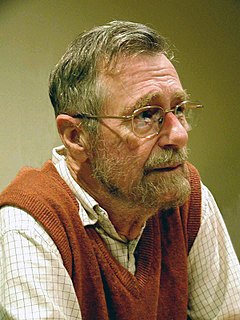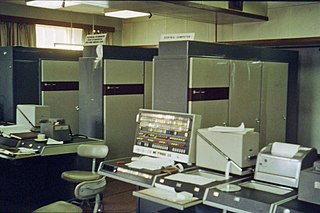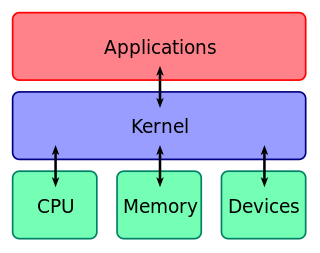Related Research Articles

Edsger Wybe Dijkstra was a Dutch systems scientist, programmer, software engineer, science essayist, and pioneer in computing science. A theoretical physicist by training, he worked as a programmer at the Mathematisch Centrum (Amsterdam) from 1952 to 1962. A university professor for much of his life, Dijkstra held the Schlumberger Centennial Chair in Computer Sciences at the University of Texas at Austin from 1984 until his retirement in 1999. He was a professor of mathematics at the Eindhoven University of Technology (1962–1984) and a research fellow at the Burroughs Corporation (1973–1984).

In computer science, a microkernel is the near-minimum amount of software that can provide the mechanisms needed to implement an operating system (OS). These mechanisms include low-level address space management, thread management, and inter-process communication (IPC).

An operating system (OS) is system software that manages computer hardware, software resources, and provides common services for computer programs.
In distributed computing, a remote procedure call (RPC) is when a computer program causes a procedure (subroutine) to execute in a different address space, which is coded as if it were a normal (local) procedure call, without the programmer explicitly coding the details for the remote interaction. That is, the programmer writes essentially the same code whether the subroutine is local to the executing program, or remote. This is a form of client–server interaction, typically implemented via a request–response message-passing system. In the object-oriented programming paradigm, RPC calls are represented by remote method invocation (RMI). The RPC model implies a level of location transparency, namely that calling procedures is largely the same whether it is local or remote, but usually they are not identical, so local calls can be distinguished from remote calls. Remote calls are usually orders of magnitude slower and less reliable than local calls, so distinguishing them is important.

Regnecentralen (RC) was the first Danish computer company, founded on October 12, 1955. Through the 1950s and 1960s, they designed a series of computers, originally for their own use, and later to be sold commercially. Descendants of these systems sold well into the 1980s. They also developed a series of high-speed paper tape machines, and produced Data General Nova machines under license.

The Department of Computer Science at the University of Manchester is the longest established department of Computer Science in the United Kingdom and one of the largest. It is located in the Kilburn building on the Oxford Road and currently has over 800 students taking a wide range of undergraduate and postgraduate courses and 60 full-time academic staff.

The Manchester Baby, also known as the Small-Scale Experimental Machine (SSEM), was the world's first electronic stored-program computer. It was built at the University of Manchester, UK, by Frederic C. Williams, Tom Kilburn, and Geoff Tootill, and ran its first program on 21 June 1948, seventy-one years ago.

Per Brinch Hansen was a Danish-American computer scientist known for his work in operating systems, concurrent programming and parallel and distributed computing.

Titan was the prototype of the Atlas 2 computer developed by Ferranti and the University of Cambridge Mathematical Laboratory in Cambridge, England. It was designed starting in 1963, and in operation from 1964 to 1973.

Pegasus was an early British vacuum tube (valve) computer built by Ferranti, Ltd that pioneered design features to make life easier for both engineers and programmers. Originally it was named the Ferranti Package Computer as its hardware design followed that of the Elliott 401 with modular plug-in packages. Much of the development was the product of three men: W.S. (Bill) Elliott (Hardware); Christopher Strachey (Software) and Bernard Swann. It was Ferranti's most popular valve computer with 38 being sold. The first Pegasus was delivered in 1956 and the last was delivered in 1959. Ferranti received funding for the development from the National Research Development Corporation (NRDC).
The RC 4000 Multiprogramming System is a discontinued operating system developed for the RC 4000 minicomputer in 1969.
Concurrent Pascal is a programming language designed by Per Brinch Hansen for writing concurrent computing programs such as operating systems and real-time computing monitoring systems on shared memory computers.
The separation of mechanism and policy is a design principle in computer science. It states that mechanisms should not dictate the policies according to which decisions are made about which operations to authorize, and which resources to allocate.

The Atlas Computer was one of the world's first supercomputers, in use from 1962 until 1971. It was considered to be the most powerful computer in the world at that time. Atlas' capacity promoted the saying that when it went offline, half of the United Kingdom's computer capacity was lost. It is notable for being the first machine with virtual memory using paging techniques; this approach quickly spread, and is now ubiquitous.

The kernel is a computer program at the core of a computer's operating system with complete control over everything in the system. It is the "portion of the operating system code that is always resident in memory". It facilitates interactions between hardware and software components. On most systems, it is one of the first programs loaded on startup. It handles the rest of startup as well as input/output requests from software, translating them into data-processing instructions for the central processing unit. It handles memory and peripherals like keyboards, monitors, printers, and speakers.

The Manchester computers were an innovative series of stored-program electronic computers developed during the 30-year period between 1947 and 1977 by a small team at the University of Manchester, under the leadership of Tom Kilburn. They included the world's first stored-program computer, the world's first transistorised computer, and what was the world's fastest computer at the time of its inauguration in 1962.

The Manchester Mark 1 was one of the earliest stored-program computers, developed at the Victoria University of Manchester from the Manchester Baby. It was also called the Manchester Automatic Digital Machine, or MADM. Work began in August 1948, and the first version was operational by April 1949; a program written to search for Mersenne primes ran error-free for nine hours on the night of 16/17 June 1949.
Super Pascal is an imperative, concurrent computing programming language developed by Brinch Hansen. It was designed as a publication language: a thinking tool to enable the clear and concise expression of concepts in parallel programming. This is in contrast with implementation languages which are often complicated with machine details and historical conventions. It was created to address the need at the time for a parallel publication language. Arguably, few languages today are expressive and concise enough to be used as thinking tools.
David William Barron FBCS was a British academic in Physics and Computer Science who was described in the Times Higher Education magazine as one of the "founding fathers" of computer science.
Information technology (IT) is the use of computers to store, retrieve, transmit, and manipulate data or information. IT is typically used within the context of business operations as opposed to personal or entertainment technologies. IT is considered to be a subset of information and communications technology (ICT). An information technology system is generally an information system, a communications system or, more specifically speaking, a computer system – including all hardware, software and peripheral equipment – operated by a limited group of users.
References
- Notes
- ↑ Lavington 1980 , pp. 50–52
- ↑ Brinch Hansen 2000
- Bibliography
- Lavington, Simon (1980), Early British Computers, Manchester University Press, ISBN 0-7190-0803-4
- Brinch Hansen, Per (2000), Classic Operating Systems: From Batch Processing to Distributed Systems, Springer-Verlag